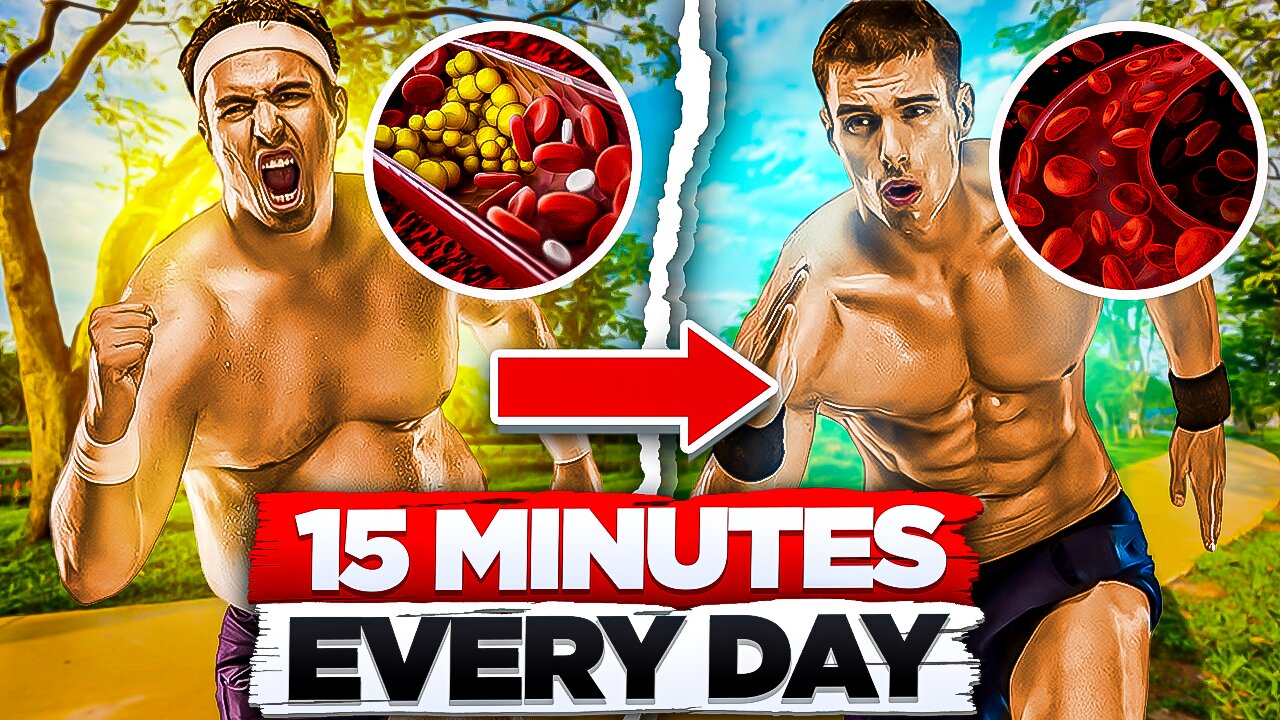Premium Only Content

What Happens To Your Body When You Run 15 Minutes Every Day
What Happens To Your Body When You Run 15 Minutes Every Day?
Is there any truth to the general belief that running is good for your health, and can running really help to improve your overall performance? In today’s video, we’ll be detailing exactly what happens to your body when you start running for at least 15 minutes everyday.
🔔 Subscribe for more tips just like this: https://www.youtube.com/channel/UCjI5n3EuxCbZ3cZYhvgjESA
✅*Mens* Brooks GTS 22 Running Shoes: https://amzn.to/3zvq1Ow
✅*Womens* Brooks GTS 22 Running Shoes: https://amzn.to/3QrsaS2
✅Heart Rate Monitor (Chest Version): https://amzn.to/3JCEA7B
✅Fitbit Charge 5: https://amzn.to/3bF6uU0
For anyone who is just starting out with making running a regular habit, it’s often difficult to get into the groove of things at first. But, after getting in a few good runs it starts to get easier and easier with time and that’s why any runner you meet is most likely to have a story to tell about how consistent running can help do your body wonders. Waking up early and getting in a nice and quick 15 minute run not only helps you physically, it even helps improve your mood too by giving you an overload of endorphins.
Getting into a good mood after a great run is a well-known and scientifically proven benefit of the practice of regular running. But, aside being a great stimulant, running has a plethora of other positive physical effects on the body as well. Foremostly, daily running plays a huge role in changing your body composition and your overall physical system. During an average run, the body undergoes a variety of changes such as burning some calories, decreasing water weight, releasing endorphins, breaking down fat tissue for fuel, and all this happens while getting you in the shape of your life…Oh, and did i mention it is also a great muscle growth stimulant?
But what exactly does your body go through during any typical 15 minute run? It doesn’t matter whether you’re a newbie or an experienced runner, as soon as your feet hit the pavement, your body begins to undergo some changes, some of which you immediately begin to feel and having a thorough understanding of what exactly these changes are and how your body goes through them will no doubt help you become a stronger runner.
During the first few seconds of your run, your muscles begin to use adenosine triphosphate, otherwise called ATP for short. ATP is the energy molecule your body produces from the food you consume and ATP does a lot of good to your body. As you start running, you almost immediately begin to feel a surge of adrenaline. Well, that’s actually your body’s ATP being converted to another powerful molecule known as Adenosine Diphosphate or ADP. This conversion of ATP to ADP is necessary to push you through the very first minute of your run, which is usually the hardest part of running, especially for beginners.
However, something very interesting starts to happen after the first 90 seconds. Your muscle cells will naturally start changing the recently derived ADP back into ATP. During this time, you’ll begin to feel yourself establishing better strides as you run, with this enabling you to release even more ATP. Also, your cells will begin to break down glycogen, a popular form of glucose which serves as the essential fuel that your muscles need to keep you going. These glycogens are stored in your muscle cells as a derivative of glucose and are pulled directly from your blood stream, your muscles begin to work more efficiently while using the glycogens as fuel and in the process help you to lower your blood sugar levels.
As you continue with your run and your body burns more glucose, they begin to release lactic acid and you will naturally begin to feel a burning sensation in your legs. At this point, your brain will alert you that you're under extreme physical stress, but you shouldn’t panic. The reality is it's actually not a bad thing. This is just a trick your brain is playing on you and this is where the phrase “no pain no gain” comes from.
When you start to feel the burn is when you are getting to the most crucial phase of your run. The next few minutes and beyond, especially if you're a new runner is where it may become tricky and more difficult for you to maintain your running pace. But you shouldn’t give in at this point as that’ll be putting all of the momentum you’ve gathered up until this point to waste....
DISCLAIMER: This video and description may contain affiliate links, which means that if you click on one of the product links, I’ll receive a commission. This helps support the channel and allows me to continue to make videos like this. I will never support or push a product I don't believe in. Thank you for your support!
#running #run #marathon
00:00 Introduction
00:27 Benefits
01:32 Science
04:23 Cardio
06:01 Aesthetics
-
 2:03:12
2:03:12
Badlands Media
9 hours agoBaseless Conspiracies Ep. 140: Benghazi Whistleblower Nick Noe - Part 2
79.4K28 -
 3:06:47
3:06:47
Laura Loomer
6 hours agoEP131: Zohran Mamdani's Radical Roots EXPOSED
30.6K26 -
 2:42:53
2:42:53
TimcastIRL
7 hours agoDOJ Drops MASSIVE Epstein COVER UP, Says There's NO CLIENT LIST | Timcast IRL
227K154 -
 54:25
54:25
Inverted World Live
6 hours agoThe JFK Assassination and How the CIA Made the Zapruder Film | Ep. 70
27.2K11 -
 10:11:25
10:11:25
SpartakusLIVE
13 hours ago$18,000 2v2 WZ Total Frenzy Tournament || #1 Comp Champ is BACK
84.1K4 -
 8:11
8:11
MattMorseTV
1 day ago $17.01 earnedMacron just SURRENDERED.
71.5K87 -
 1:35:03
1:35:03
Glenn Greenwald
9 hours agoTrump DOJ: There's Nothing to the Epstein Story; State Dept: Syria's Al-Qaeda are No Longer "Terrorists;" Trump & Lula Exchange Barbs Over Brazil | SYSTEM UPDATE #482
158K130 -
 2:18:39
2:18:39
We Like Shooting
19 hours ago $5.11 earnedWe Like Shooting 618 (Gun Podcast)
37.5K -
 2:42:17
2:42:17
Barry Cunningham
8 hours agoHERE'S WHY SOME IN MAGA ARE SO NEGATIVE ABOUT PRESIDENT TRUMP?
79.1K38 -
 1:54:30
1:54:30
Joker Effect
5 hours agoWhy Gaming Streamers Aren't Successful and How To Fix It. Tim The Tatman was RIGHT... Kinda
38.4K2